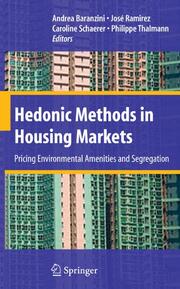Detailansicht
Hedonic Methods in Housing Markets
Pricing Environmental Amenities and Segregation
ISBN/EAN: 9781441926388
Umbreit-Nr.: 1602069
Sprache:
Englisch
Umfang: xxii, 278 S., 26 s/w Illustr., 278 p. 26 illus.
Format in cm:
Einband:
kartoniertes Buch
Erschienen am 29.10.2010
Auflage: 1/2008
- Zusatztext
- InhaltsangabeMethods.- Theoretical Foundations and Empirical Developments in Hedonic Modeling.- Hedonic Modeling of the Home Selling Process.- Applications to Urban Environment Issues.- Hedonic Property Value Studies of Transportation Noise: Aircraft and Road Traffic.- Pricing the Homebuyer's Countryside View.- Semi-Parametric Tools for Spatial Hedonic Models: An Introduction to Mixed Geographically Weighted Regression and Geoadditive Models.- Estimating Hedonic Models of Consumer Demand with an Application to Urban Sprawl.- Applications to Segregation and Discrimination Issues.- Conceptual and Operational Issues in Incorporating Segregation Measurements in Hedonic Price Modeling.- Using Hedonic Models to Measure Racial Discrimination and Prejudice in the U.S. Housing Market.- The Problem with Environmental Justice Studies (And How Hedonics Can Help).- Distinguishing Racial Preferences in the Housing Market: Theory and Evidence.
- Kurztext
- Cities are growing worldwide and their sprawl is increasingly challenged for its pressure on open spaces and environmental quality. Economic arguments can help to decide about the trade-off between preserving environmental quality and developing housing and business surfaces, provided the benefits of environmental quality are adequately quantified. To this end, this book focuses on the use and advancement of the "hedonic approach", an economic valuation technique that analyses and quantifies the sources of rent and property price differentials. Starting from theoretical foundations, the hedonic approach is applied to the valuation of natural land use preservation and noise abatement measures, as well as to residential segregation and discrimination, extending the analysis to the role of the buyers' and sellers' identity on housing market prices and to the issue of environmental justice.
